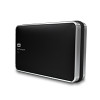Western Digital My Passport Pro User Manual - Page 19
Erasing the Device Drives, Applications, WD Drive Utilities, Drive, Erase, Drive Erase, Erase Drive
 |
View all Western Digital My Passport Pro manuals
Add to My Manuals
Save this manual to your list of manuals |
Page 19 highlights
MY PASSPORT PRO USER MANUAL Erasing the Device Drives CAUTION! Erasing a drive permanently deletes all of the data on the drive. Always back up the data on the drive before erasing it. Note: Erasing your device drives also deletes the WD software and all of the support files, utilities, and user manual files. You can download these to restore your device to its original configuration after erasing the drives. See Knowledge Base answer ID 7 at http://support.wd.com for information about downloading and restoring the WD software and disk image. 1. Click Go > Applications > WD Drive Utilities to display the WD Drive Utilities screen (see Figure 4 on page 8). 2. If you have more than one supported storage device or drive connected to your computer, select the one that you want to erase. 3. Click Drive Erase to display the Drive Erase dialog: For RAID Configurations For Individual Drives 4. On the Drive Erase dialog: a. For individual drives, select the check box for each drive that you want to erase: Erase Drive A Erase Drive B b. If you want to change the name of a volume, type over the name in the Volume Name box. c. For individual drives, select the option to specify the file format for each volume: HFS+J ExFAT Note that the exFAT (extended File Allocation Table) format is not RAID configurable. MANAGING AND CUSTOMIZING YOUR MY PASSPORT PRO DEVICE - 16















